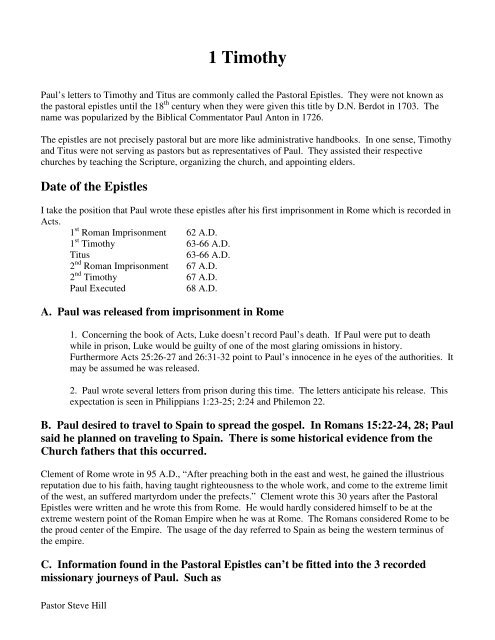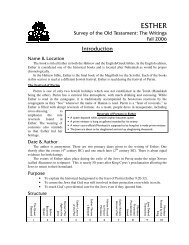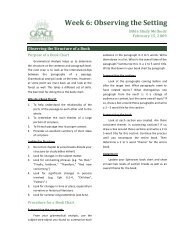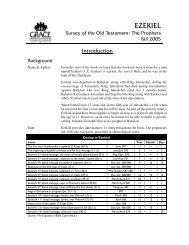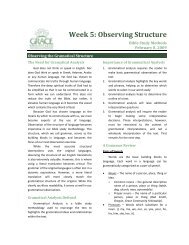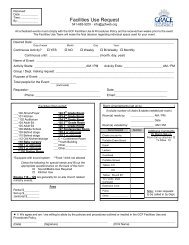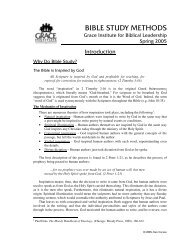1 timothy for institute - Grace Community Fellowship
1 timothy for institute - Grace Community Fellowship
1 timothy for institute - Grace Community Fellowship
- No tags were found...
You also want an ePaper? Increase the reach of your titles
YUMPU automatically turns print PDFs into web optimized ePapers that Google loves.
1 TimothyPaul’s letters to Timothy and Titus are commonly called the Pastoral Epistles. They were not known asthe pastoral epistles until the 18 th century when they were given this title by D.N. Berdot in 1703. Thename was popularized by the Biblical Commentator Paul Anton in 1726.The epistles are not precisely pastoral but are more like administrative handbooks. In one sense, Timothyand Titus were not serving as pastors but as representatives of Paul. They assisted their respectivechurches by teaching the Scripture, organizing the church, and appointing elders.Date of the EpistlesI take the position that Paul wrote these epistles after his first imprisonment in Rome which is recorded inActs.1 st Roman Imprisonment 62 A.D.1 st Timothy 63-66 A.D.Titus63-66 A.D.2 nd Roman Imprisonment 67 A.D.2 nd Timothy 67 A.D.Paul Executed68 A.D.A. Paul was released from imprisonment in Rome1. Concerning the book of Acts, Luke doesn’t record Paul’s death. If Paul were put to deathwhile in prison, Luke would be guilty of one of the most glaring omissions in history.Furthermore Acts 25:26-27 and 26:31-32 point to Paul’s innocence in he eyes of the authorities. Itmay be assumed he was released.2. Paul wrote several letters from prison during this time. The letters anticipate his release. Thisexpectation is seen in Philippians 1:23-25; 2:24 and Philemon 22.B. Paul desired to travel to Spain to spread the gospel. In Romans 15:22-24, 28; Paulsaid he planned on traveling to Spain. There is some historical evidence from theChurch fathers that this occurred.Clement of Rome wrote in 95 A.D., “After preaching both in the east and west, he gained the illustriousreputation due to his faith, having taught righteousness to the whole work, and come to the extreme limitof the west, an suffered martyrdom under the prefects.” Clement wrote this 30 years after the PastoralEpistles were written and he wrote this from Rome. He would hardly considered himself to be at theextreme western point of the Roman Empire when he was at Rome. The Romans considered Rome to bethe proud center of the Empire. The usage of the day referred to Spain as being the western terminus ofthe empire.C. In<strong>for</strong>mation found in the Pastoral Epistles can’t be fitted into the 3 recordedmissionary journeys of Paul. Such asPastor Steve Hill
1 Timothy 1:3: Paul departs <strong>for</strong> Macedonia with instructions <strong>for</strong> Timothy’s work in Ephesus.1 Timothy 3:14-15 While Paul hopes to come to Ephesus soon, he probably will be delayedTitus 1:5; Paul refers to a recent trip to Crete.Titus 3:12: Paul intends to spend the winter in Nicopolis which is probably located in theprovince of Achaia.2 Timothy 4:13-20: Paul had recently visited Troas, Miletus and probably Corinth.2 Timothy 1:16-17; 2:9: When Paul wrote 2 Timothy he was imprisoned in Rome.Chronology Details1. After his release from the Roman imprisonment Paul returned to the East at least as far as Asia Minor.While in the East he may have written 1 Timothy and Titus. This means he first would have visitedCrete, Ephesus, Colosse, and Macedonia.2. Paul traveled to Spain and stopped in Nicopolis <strong>for</strong> the winter.3. Then Paul would have returned to the East be<strong>for</strong>e his final imprisonment. Here he visited Miletus,Troas, and Corinth. Finally he wrote 2 Timothy from a prison in Rome where he was executed in Romein the spring of 68 A.D.Why did Paul write 1 TimothyPaul wrote 1 Timothy because of a possible delay in his arrival at Ephesus (3:14). Certain matters neededto be taken care of such as false doctrine in the church, leadership issues, church management, andpractices.The doctrinal difficulties stemmed from two groups. The first group are the Judiazers who wanted toimplant the Mosiac Law into the gospel. Paul frequently confronts and condemns them <strong>for</strong> leading peopleastray. The book of Galatians is an example.The second group are the Gnostics. In the second century, Gnosticism was spreading rapidly across theRoman empire. The roots of this movement started in the first century. Paul and John seem to beresponding to this incipient Gnostic belief. Christian leaders thoroughly denounced Gnosticism in thesecond and third centuries. Gnostics believed that the material world was evil and that the spiritual worldis good. This belief is commonly called Dualism. Only a few will attain salvation because they have the“divine spark” within them. Gnostics believed that matter is evil and this led to the conclusion that Jesusdid not have a real body.Pastor Steve Hill
Outline and NotesI. 1 Timothy 1:1-2 SalutationIn Paul’s day the author of a letter would state their name at the beginning. The introduction is a normalgreeting <strong>for</strong> Paul. He calls Timothy his “true son”.II. Problems in the church are corrected 1 Timothy 1:3-20A. 1 Timothy 1:3-11 False doctrine is confronted and corrected. Judiazers have caused controversiesinstead of promoting unity through love.- Verses 3 & 4 are incomplete sentences in the Greek. This indicates Paul’sdeep emotion.- Genealogies:- The goal of ministry in the church is love and sincere faith. Everything elseis the means to this end.- The purpose of the law: Surfacing and restraining sinB. 1 Timothy 1:12-20 This section provides a foundation of salvation by grace through faith. Paul givesa personal illustration of grace in his life (1:12-17) and an illustration of grace in Timothy’s ministry(1:18-20). <strong>Grace</strong> is in contrast to the law which is mentioned in the previous paragraph.- <strong>Grace</strong> emphasizes freedom without cost. Mercy emphasizes the misery of the recipient.- Judiazers ignorantly emphasized action apart from the Holy Spirit.- <strong>Grace</strong> leads the believer to Worship.- Paul draws an interesting relationship between the sin of man and the sovereignty of God.God’s grace is sovereignly given to sinful people.- Paul repeats himself five times in Pastoral Epistles with the words, “faithful saying.” Threetimes he repeats the phrase “faith and good conscience.”- Timothy’s fight is not with the world but with false teachers. Perhaps we could learn thislesson today.- False Doctrine can shipwreck our faith. Hymenaeus and Alexander are leaders in the falseteaching movement. Paul hands them over to Satan. I take this to mean that they arekicked out of the fellowship and suffer the consequences. In addition, this is not merely aPastor Steve Hill
church discipline issue. An apostle is handing them over to Satan. Perhaps the ministry ofthe Holy Spirit allows satanic attack.III. Practices in the Church 1 Timothy 2:1-3:13A. 1 Timothy 2:1-8 Paul urges prayer <strong>for</strong> everyone but specifically asks <strong>for</strong> kings and the authorities.The result of leaders following a godly path is peace in society.- All men to be saved- One mediatorB. 1 Timothy 2:9-15 Instructions are given concerning the role of women in the church. First, Pauladdresses the issue of modesty in dress. Second, the role of women in the church is discussed. This is ahotly debated topic today among evangelical Christians.C. 1 Timothy 3:1-13 Godly leadership was important to Paul. Timothy had a responsibility to selectand train elders.- Elders- Deacons- WomenIII. How Timothy should handle the problems in Ephesus 1 Timothy 4:1-6:21A. 1 Timothy 4:1-16 Paul has little tolerance <strong>for</strong> false doctrine because of the destructive results.Timothy’s responsibility is to teach sound doctrine and confront false teachers. Paul plans on visitingTimothy so he must persevere until the apostle arrives.1. A description of the apostasy 4:1-5- Spiritual deception- Demonic activity- Ascetic philosophy- Legalistic2. Confrontation is necessary 4:6-10Pastor Steve Hill
- Teach correct doctrine- Live a godly life3. Paul’s challenge to Timothy 4:11-16- Stand strong- Teach publicly- Use your talents- PersevereB. 1 Timothy 5:1-6:2 Paul exhorts Timothy to treat people respectfully and to organize the church in aresponsible way.1. Timothy must be careful when confronting older men. 5:1-22. Widows must be taken care of. 5:3-16- Formal list to receive financial help- Family members should be the first to help- Older widows3. Elders giving oversight to the church 5:17-25- Some are paid- Accusations against an elder- If accusations are correct, the elder must be publicly rebuked- Take time in selecting an elder4. Conduct of slaves 6:1-2C. 1 Timothy 6:3-21 Paul concludes this letter by restating his concern over false doctrine. However,the apostle finds it necessary to confront those who are self-centered with their material possessions. Paulsays that the “love of money” is the root of all evil. When people love money more than the Lord theywill do all kinds of things to get rich. In this section we can observe the following structure.Love of Money 3-10Live a Godly Life 11-16Love of Money 17-19Live a Godly Life 20-211. Apparently some people served and taught with wrong motives. They wanted to get rich.Sometimes false doctrine and greed are connected. 6:3-10- Godliness- Greed2. Timothy must keep his ministry going by pursuing godliness 6:11-16Pastor Steve Hill
- Pursue holiness- Persevere to the end3. Keeping a good perspective about money is important. 6:17-19- Share with others- Invest in eternity4. Closing thoughts <strong>for</strong> Timothy 6:20-21Pastor Steve Hill


